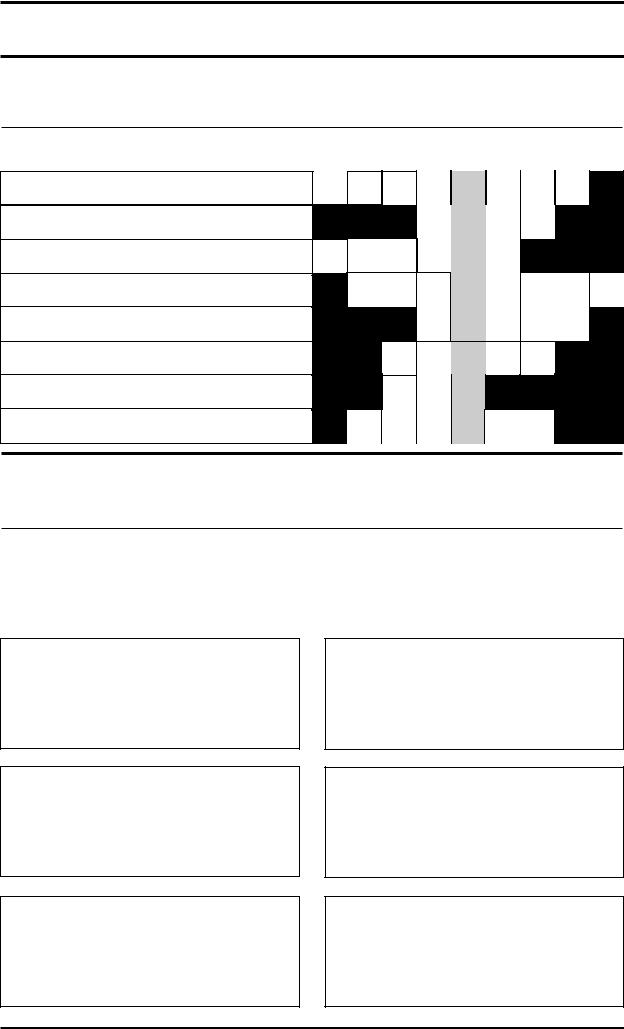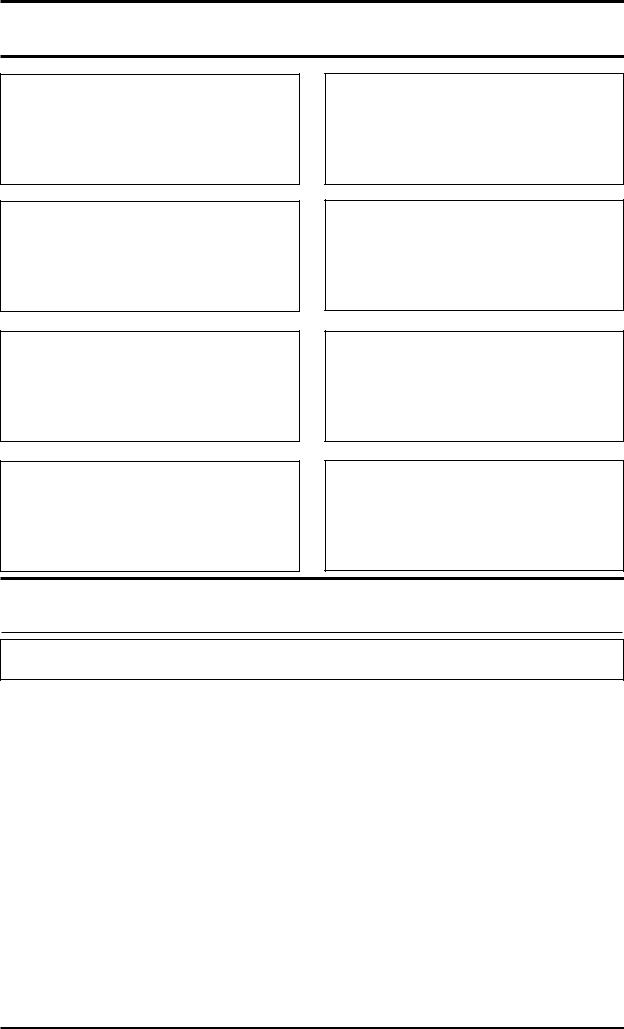
- •Introduction
- •Contents
- •General Vocabulary
- •Adjectives to nouns
- •Compound adjectives
- •Compound nouns
- •Confusing pairs and false friends
- •Contrast and comparison
- •Expressions with get
- •Human actions
- •Materials
- •Modified words
- •Noises
- •Nouns and verbs to nouns
- •Opposites 1
- •Opposites 2
- •Opposites 3
- •Prepositions
- •Shape and size
- •Spelling
- •Verbs to adjectives
- •Verbs to nouns
- •Working words
- •Accommodation
- •The arts
- •Character and personality
- •Clothes
- •Crime
- •Education
- •Food and drink
- •Free time activities
- •Geography
- •Health
- •Learning languages
- •The media
- •Money
- •Nature and the environment
- •On the road
- •Relationships
- •Services and facilities
- •Shopping
- •Sport
- •Travel and holidays
- •24 hours
- •Work
- •Answers

topic-specific vocabulary
46
Working words
This exercise lets you review some of the more common uses of 'grammar'-type words (prepositions, conjunctions, pronouns, prepositions, etc) in context. Use one word to complete each gap in the sentences. In some cases, there may be more than one alternative answer, but you should just give one of them.
1.I'm afraid __________ say you have absolutely __________ chance __________ passing the exam.
2.A few years __________, people __________ to write letters to each other. __________ days, it's all e- mails and text messages.
3.You can't leave early, __________ if you promise to work late tomorrow.
4.__________ 1999 and 2003, the book sold __________ a million copies.
5.One or two of my friends live abroad, but _________ of them live __________ my home.
6.Please __________ quiet. I'm trying to concentrate __________ my project.
7.__________ it rains tomorrow, we can go __________ a picnic.
8.We wanted to see the exhibition __________ the art gallery, but __________ how many other people
__________ be there, we decided to give it a miss.
9.In __________ of missing most of his lessons, he __________ to pass the exam.
10.Teachers are __________ capable of making mistakes as __________ else.
11.I adore spicy food. __________ is the reason I'm so keen __________ Mexican cooking.
12.Jan Kelly, a teacher __________ works at St Clare's in Oxford, has __________ been given a 'Teacher of the Year' award.
13.He approached his English lessons __________ enthusiasm, and __________ excellent progress as a result.
14.His sudden change of heart took everyone __________ surprise, since previously he __________ been very interested in the project.
15.He spent the second half of his life living in __________ remote village of Hogstail Common,
__________ he wrote most of his novels.
16.Some people try to __________ up cigarettes by smoking __________ they feel sick, or by limiting themselves to one or __________ a day, but __________ methods are not very effective.
17.My English school, __________ is near the centre of town, is __________ of the best schools in the
__________ country.
18.There were at __________ sixty people in the room, which was far __________ than the organisers expected, and __________ there were only 20 chairs, most of us __________ to stand.
19.In most respects he was a normal child, but __________ made him different __________ everybody
__________ was his enthusiasm for solving complex mathematical puzzles.
For reference, see the Easier English Dictionary for Students (0 7475 6624 0)

Accommodation
Task 1. VERBS
Rearrange the words in bold and write them in the grid on the right. The first letter of each word has been underlined. When you have finished, you will find another word which means 'to make a building like new again' in the shaded vertical strip.
1.I really think we should rocedeta the kitchen. What colour do you think would be best?
2.We need to tern a flat in the middle of town, but I think they're quite expensive.
3.The landlord is going to netexd the lease on our flat.
4.The council want to medoshli our apartment block as they think it's dangerous.
5.I think the landlord is going to ticve us soon; he's says we make too much noise.
6.We plan to seale our spare offices to an American company.
7.The flat is to tle at £1,000 per month.
8.They've bought a new house and are going to
meov ni next week.
Task 2. NOUNS AND ADJECTIVES
A. Read the descriptions 1 - 14 and decide which type of accommodation is being described in each one. Use your dictionary to look up the meanings of the adjectives in bold.
detached house |
• |
semi-detached |
house |
• |
house |
• |
mansion |
||||
palace |
• |
castle |
• |
bungalow |
• |
cottage |
• |
caravan |
|||
prison |
cell |
• |
hospital |
ward • |
barracks |
• |
houseboat |
• flat |
|||
|
|
|
|
|
|
|
|
|
|
|
|
vocabulary specific-topic
1. It's quite an old house, and the walls are paper-thin, so we can hear everything the neighbours on both sides are doing.
3. The patients on either side of me are really nice, which is good because otherwise this place is really depressing. I hope I get well soon.
5. It's a bit cramped, but the great advantage is that, when we get fed up with one place, we just attach it to the back of the car and move on.
2. There are three of us in here and it's really claustrophobic, especially as we can't open the window and the door is locked all the time. Oh well, only another 7 years to go!
4. Towers and turrets, bastions and battlements. Mist on the moat and dragons under the drawbridge. This place is awe-inspiring.
6. It's lovely out here in the countryside and we try to spend as much time here as possible. It's quite a little house, but very cosy, of course.
47
For reference, see the Easier English Dictionary for Students (0 7475 6624 0)

topic-specific vocabulary
48
Accommodation
7. It's a very large, spacious house with a long drive, beautiful gardens and a view over the golf course. There are fifteen bedrooms, although we don't use them all of course!
9. Our next-door neighbour likes to play loud music at night, so we moved the bedroom to the other side of the house where there aren't any neighbours directly next door.
11.My grandparents bought it last year. Its main advantage is that it only has one floor, so they don't have to worry about climbing any stairs.
13.The block where we live is next to the underground station. It's smaller than our old house, of course, but we have a great view from the 8th floor.
8. Although we live in the city, our house stands alone in its own garden. This means that we don't get any noise from the neighbours on either side.
10.I'm not sure who lives there now, but at one time it was the residence of King George III. It's very grandiose; 120 bedrooms and almost 600 hectares of land.
12.It's moored on the River Thames near London. It's very peaceful, apart from the noise from the ducks and geese.
14.There are fifteen of us in here, but the sergeant-major makes sure we keep it tidy. If we don't, we get extra guard-duty!
B. The box below contains a list of words giving the names of different rooms and other parts of a house or flat. These words have all been joined together, and to make it more difficult for you, they have all been written backwards! Can you separate them into individual words?
roolftsrifroolfdnuorglaireanoisiveletyenmihcfoorynoclabecarretnedragsriatscittamoord ebmoorhtabrallecllahnehctikmoorgninidmoorgnivil Start here, and read backwards.
Did you know?
There are some differences between British English and American English when we talk about accommodation. These are:
British English: |
|
American English: |
Ground floor |
= |
First floor |
First floor |
= |
Second floor |
Garden |
= |
Yard |
Terraced house |
= |
Townhouse |
Detached house |
= |
One-family house |
Flat |
= |
Apartment |
Bungalow |
= |
Ranch house |
Caravan |
= |
Trailer |
In American English, the living room is sometimes called the den.
In Cambridge exams like the FCE and the CAE, American English is acceptable, provided you use it consistently.
For reference, see the Easier English Dictionary for Students (0 7475 6624 0)

Accommodation
Task 3. IDIOMS, COLLOQUIALISMS AND OTHER EXPRESSIONS
Look at the following sentences and decide whether the explanations which follow them are TRUE or FALSE.
1.The hotel is a real home from home.
The hotel is not very comfortable. TRUE / FALSE
2.He lay down on the sofa, opened a bottle of beer and made himself at home.
He behaved differently from the way he did in his own house. TRUE / FALSE
3.His new job is nothing to write home about.
His new job is not very exciting or special. TRUE / FALSE
4.The pub serves homely food.
The food in the pub is not very good. TRUE / FALSE
5.I had to tell her a few home truths.
I had to tell her some unpleasant facts about her. TRUE / FALSE
6.Cheer up, we're in the home straight now!
We've been working on a long project and have almost finished it. TRUE / FALSE
7.James lives in cardboard city.
James lives in a very comfortable house. TRUE / FALSE
8.The staff in the hotel were very accommodating.
The staff in the hotel were very helpful. TRUE / FALSE
9.Caron is my flat-mate.
Caron lives in the flat next door to mine. TRUE / FALSE
10.It's been a long, hard project, but we're almost home and dry.
The project is almost successfully finished. TRUE / FALSE
11.We need to drive the hammer home as soon as possible.
We need to start working as soon as possible. TRUE / FALSE
12.I took a job working as a home help.
I took a job helping people to move from one home to another. TRUE / FALSE
vocabulary specific-topic
49
For reference, see the Easier English Dictionary for Students (0 7475 6624 0)
